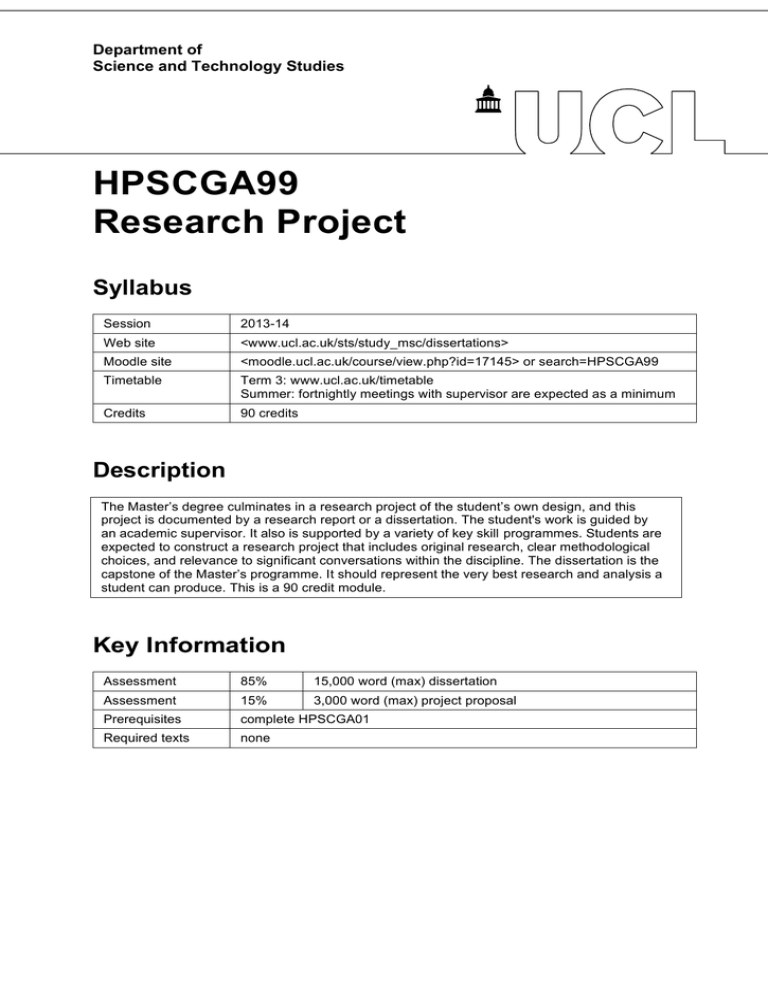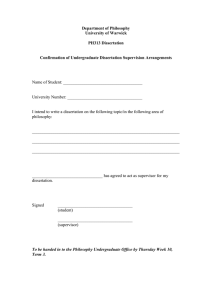HPSCGA99 Research Project Syllabus Department of
advertisement

Department of Science and Technology Studies HPSCGA99 Research Project Syllabus Session 2013-14 Web site <www.ucl.ac.uk/sts/study_msc/dissertations> Moodle site <moodle.ucl.ac.uk/course/view.php?id=17145> or search=HPSCGA99 Timetable Term 3: www.ucl.ac.uk/timetable Summer: fortnightly meetings with supervisor are expected as a minimum Credits 90 credits Description The Master’s degree culminates in a research project of the student’s own design, and this project is documented by a research report or a dissertation. The student's work is guided by an academic supervisor. It also is supported by a variety of key skill programmes. Students are expected to construct a research project that includes original research, clear methodological choices, and relevance to significant conversations within the discipline. The dissertation is the capstone of the Master’s programme. It should represent the very best research and analysis a student can produce. This is a 90 credit module. Key Information Assessment 85% 15,000 word (max) dissertation Assessment 15% 3,000 word (max) project proposal Prerequisites complete HPSCGA01 Required texts none HPSCGA99 Research Project 2013-14 syllabus Module tutors Module tutor Dr Andrew Gregory Contact andrew.gregory@ucl.ac.uk | t: 020 7679 Web www.ucl.ac.uk/sts/gregory Office location 22 Gordon Square, Room 1.3 Office hours: by appointment Aims and objectives aims To produce a 15,000 word dissertation, to introduce the students to research methods and give them some experience in a substantial research project. objectives By the end of this module students should be able to: produce substantial written scholarship, with an original contribution to knowledge or a substantial synthesis of existing research demonstrate an ability to plan and execute a substantial research project Module plan Step 0: Advice session The dissertation coordinator will organize an advice session during Term 2. Students are strongly encouraged to discuss possible topics with potential supervisors throughout Terms 1 and 2. Step 1: register topic and supervisor The first formal step in the project is to complete “Register topic and supervisor”. This form is available on the Moodle site. This is due on the second day of Term 3. The purpose of this form is to confirm supervisory arrangement for the dissertation. A signature commits the supervisor to their role. We use this form to remove ambiguity over who has agreed to serve in this role. The title is meant to be provisional, and it is understood it may vary over the course of the project. Students who do not submit a completed registration form within two weeks of the deadline will be assigned a supervisor and may be assigned a project. Supervisors A supervisor is required. They must be a member of STS academic staff. This is required to ensure comparability and clarity about the scale of the project. The main responsibilities of the supervisor is to assist the student with project management and to advise the student on criteria 2 HPSCGA99 Research Project 2013-14 syllabus for assessment. We do not make formal assignments of co- or joint-supervisors. Students are encouraged to consult others in the course of their project, within STS and elsewhere; however, that assistance is voluntary. Step 2: project proposal In Term 3, students write a 3,000-word project proposal. This is due on the last Monday of Term 3, at midnight 24:00 and uploaded through Moodle. This is assessed. The purpose of this proposal is to refine key research questions, review existing scholarship, identify substantial resources, and identify methodologies. Relevant ethics documentation should be appended. STS will aim to return assessments for the proposal within 2 weeks of submission, with substantial comments to discuss with your supervisor. The proposal should reflect a student’s best effort. At the same time, we recognize research often raises new questions. Some slippage of topics and titles is natural. Students should keep their supervisors up to date on these developments, and they can expect a reasonable degree of adaptation. research preparation workshops In Term 3, STS will offer a series of workshops to assist with research preparation and project proposals. Students are expected to attend at least half the sessions offered. These are timetabled for Tuesdays and Thursdays 3-5 throughout Term 3. The subject schedule will be posted after submission of “register” forms because we will adapt the programme to maximize the impact for projects. Students are welcome to propose sessions to suit their needs; discuss this with the dissertation coordinator. We cannot guarantee to satisfy all requests, but we want to be responsive. Step 3: dissertation or final report The dissertation, or final report, is due on the first Friday in September, at midnight 24:00. It is uploaded through the module’s Moodle page. To assist with project development, STS will schedule a “work-in progress” conference. work-in-progress presentations In early July, students will be invited to deliver a work-in-progress (WIP) presentation. This is not assessed. In our experience, this presentation is an important milestone in project development. It’s a moment to collate results, seek ties to existing literature, and synthesize many pieces into a working whole. It is also important, in relation to the job market and further education, to gain experience at giving presentations of your research work research process Styles of research vary. Ultimately, it is the student’s responsibility to manage their time, their research, and their use of the primary supervisor. STS has no standard expectation for how the project should be undertaken. However, students are strongly advised to consult their supervisor on a regular basis, ideally via fortnightly supervisions. Students should be frank about their progress and needs. They should anticipate difficulties. They should pay close attention to time management. Supervisors may read drafts of dissertation material and draft sections; however, students need to provide adequate time for this process. Do not assume your supervisor will be free to read your thesis in the last days before it is due. Even if they can, they can offer little in the way of constructive advice at so late a stage. Use your supervisor early in the process so they can use their experience to help guide your research. Plan ahead. Of course, your supervisor is not the 3 HPSCGA99 Research Project 2013-14 syllabus only person who may advise you on your writing: peers, friends, family, and other experts. In general, other STS academic staff will not read your drafts, as they have other primary commitments. Schedule Date Topic Activity 13 Jan 14 advice session coordinator will discuss the module 29 Apr 14 “register” due submit “Register topic and supervisor” by hand or email attachment to dissertation coordinator 08 Jun 14 project proposal due upload through HPSCGA99 moodle 04 Jul14 (pm) work-inprogress presentations optional opportunity to discuss your work-inprogress and to receive assistance from peers 05 Sep 14 Dissertation due upload through HPSCGA99 moodle Assessment summary Description Word limit CW dissertation or research report (85%) 15,000 CW research proposal (15%) 3,000 supplemental notes Maintain a research notebook: It is best practice to maintain a notebook to document ongoing work within a research project. Students are advised to maintain such a notebook, whether digital or paper, and to keep it up to date. Protect yourself against loss of research material and writing: We cannot stress enough the importance of maintaining a system for secure, redundant, up-to-date back-up of research material and writing. Loss cannot be accepted as a reason for failing to meet a deadline. Storage of materials on UCL’s ISD network is expected as a minimum, and other mechanisms – such as cloud storage – are recommended. A copy of written notebooks can be stored by supervisors for the duration of the project. Loss of project materials through accidents and theft have occurred in the past; these have had devastating effects on the unprepared. All students are warned to create redundancies to protect their project from similar calamities. Extensions: Short-term extensions normally are not considered. This is a long-term research project, and time management is a learning objective. Applications for extension are made to the supervisor or dissertation coordinator in the first instance; to the PGT programme tutor in the second instance. Extensions for the dissertation must be agreed with the Chair of the STS Board of Exams. Ethics: Students must follow UCL policy on research ethics, meaning all research involving 4 HPSCGA99 Research Project 2013-14 syllabus humans must be subjected to review for ethical standards, data protection, and safety. STS procedures are described here: <www.ucl.ac.uk/sts/ethics>. Documentation must be appended to the dissertation, and may be included in the project proposal. A dissertation or project report will receive a mark of zero if it is submitted without evidence of ethics review when humans are involved as research subjects. Inversely, proper ethics review is accommodated in the criteria for assessment and rewarded appropriately. Word counts: Words counted towards the total word count include the main body of the work and supporting footnotes or endnotes. The word count does not include: bibliography, front matter (title page, keywords, abstract, table of contents, acknowledgments), appendix material, supplemental data packages, tables, table and figure legends, or documentation of ethics protocols or approvals. UCL standard policy on word counts will apply.. Re-using coursework from other modules: Text and ideas in the research proposal may reappear in the dissertation if significantly developed or elaborated; however, UCL’s policy on self-plagiarism prevents the same work from receiving credit twice. This means rote duplication is not allowed. Students should work closely with their academic supervisors to ensure compliance: better to ask than to guess. Criteria for assessment research proposal Clear description and outline of the research proposal – clear description of the research methodology – clear outline of the bibliography to be consulted – good sense of the development of chapters – good idea of the research conclusion being aimed at. dissertation Clear and incisive descriptions. Coherent and original line of argument strongly supported by detailed references to appropriate secondary and primary sources. Clear grasp of the broader historiographical significance of the issues under discussion. Understanding of why the details being discussed are significant. Appreciation of the degree of certainty/uncertainty with which propositions may be advanced. Accurate spelling, punctuation, and grammar. Full referencing, including of sources of data. A = 70+% Essays and examination answers judged to be of distinction quality normally receive marks in the range 70-85%. Only in very exceptional circumstances will work be awarded a mark greater than 85% (judged to be of publishable quality). The dissertation should represent either original work or a novel analysis of existing literature. Use of primary sources is expected. A thorough and up-to-date knowledge of relevant secondary literature also is expected. B = 60-69% Most, but not all of the above. Less mark of individuality and originality. Clear evidence that the writer would be capable of sustained independent investigation if time and opportunity were present. 5 HPSCGA99 Research Project 2013-14 syllabus C = 50 59% Clear evidence that an adequate amount of time has been spent in preparing the essay. Good grasp of the basic issues. Marks may have been deducted for: limited range and depth of reading; tendency to summarise the work of others rather than to synthesise the fruits of research into a discernible thesis; failure to maintain a consistent narrative and/or argument throughout essay; generalisations beyond the evidence offered; inadequate or inaccurate referencing; poor grammar, punctuation and/or spelling. F = Below 50% Inadequate in understanding and argumentation. Marks are deducted for: incoherent arguments; inaccurate facts or erroneous understanding of texts; unsupported personal opinions; poor grammar, punctuation, or spelling; tortured writing style; inadequate or inaccurate referencing of sources. Important policy information Details of college and departmental policies relating to modules and assessments can be found in the STS Student Handbook www.ucl.ac.uk/sts/handbook All students taking modules in the STS department are expected to read these policies. 6

